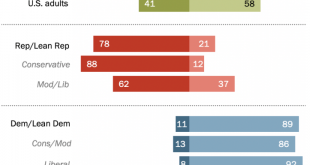from Blair Fix They say that Americans love two things: freedom … and guns. The trouble with guns is obvious. The trouble with freedom is more subtle, and boils down to doublespeak. When a good old boy defends his ‘freedom’, there’s a good chance he has a hidden agenda. He doesn’t want freedom for everyone. He wants ‘freedom for himself, not you’. I call this sentiment freedom tribalism. It’s something that, given humanity’s evolutionary heritage, is predictable. It’s also something...
Read More »CO2 since the start of the Industrial Revolution
The amount of carbon dioxide in the atmosphere (raspberry line) has increased along with human emissions (blue line) since the start of the Industrial Revolution in 1750. Emissions rose slowly to about 5 billion tons a year in the mid-20th century before skyrocketing to more than 35 billion tons per year by the end of the century. NOAA Climate.gov graph, adapted from original by Dr. Howard Diamond (NOAA ARL). Atmospheric CO2 data from NOAA and ETHZ. CO2 emissions data from Our World in...
Read More »Biden, China, and the New Cold War
from Dean Baker After Donald Trump’s clown shows, it was nice to have a U.S. president who at least takes world issues seriously while representing the country at the various summits over the last week. But that is a low bar. While we want adults in positions of responsibility, we have to ask where those adults want to take us. It is not clear that we should all eagerly follow the path that President Biden seems to be outlining with regard to China. Unfortunately, people in the United...
Read More »Beware – someone is fraudulently collecting funds “for the WEA”
Dear Ed, Someone hacked my gmail account and is using it to fraudulently ask for funds/money; arguing its needed for WEA. Please alert all members Thanks Juan Carlos PS see the photo here attached of the message sent to Marc using my gmail account!
Read More »The impasse in external debt relief
C. P. Chandrasekhar and Jayati Ghosh When the pandemic first swept across the globe and destroyed economies in its wake, there were at least some expressions of international solidarity among leaders of the rich countries. External debt problems were widely recognised to be inevitable in the new crisis context; to address them, G20 governments declared a Debt Service Suspension Initiative (DSSI) from May 2020, designed to reduce some of the immediate debt repayment burden of the poorest...
Read More »Real business cycles — nonsense on stilts
from Lars Syll They try to explain business cycles solely as problems of information, such as asymmetries and imperfections in the information agents have. Those assumptions are just as arbitrary as the institutional rigidities and inertia they find objectionable in other theories of business fluctuations … I try to point out how incapable the new equilibrium business cycles models are of explaining the most obvious observed facts of cyclical fluctuations … I don’t think that models so...
Read More »Cash industry association slams banks’ war on cash
from Norbert Häring The hypocrisy of a working group led by the European Central Bank (ECB) on the preservation of cash, which is dominated by banks who at the same time continue to wage their war on cash, has been exposed by cash industry group ESTA in a report. ESTA sent the report to this working group – after it had recently left it in protest. As a part of its cash strategy, which the ECB Governing Council adopted last September and which it has been hiding in the depths of the ECB’s...
Read More »A Brief History of Health Insurance with Dean Baker
Inspired by a tweet (I probably spend too much time on Twitter), I wanted to understand why health insurance doesn't extend to our eyes and teeth, why the US doesn't have a more robust public health system (thanks racism), how healthcare and drugs got to be so expensive (thanks Bob Dole), and what healthcare looks like in a "post-COVID" world. The tweet: https://twitter.com/stepville/status/1397760624449359882 <br> Connect with Dean Baker on the internet:...
Read More »Remote working pay cut?
from Peter Radford When a large corporation goes on the hunt for a lower cost base of operations I doubt whether it thinks it will be penalized for what is a rational and frequently made decision. After all if you can make the same revenue and reduce your costs your profit goes up. Yeah. Capitalism 101. If we all go about life in this way, and if we believe Adam Smith, all this pursuit of self-interest will shower society with the glories of social benefits previously unheard of. I...
Read More » Real-World Economics Review
Real-World Economics Review







